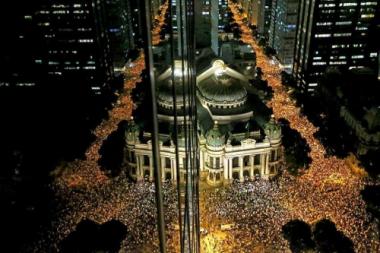
If Brasil's oppressors are forced to recognize that an era of real democracy has arrived, I will be very happy to pay 20 cents more for my bus rides.
Editor's note: on Monday night, the popular protests that have been rocking Brasil for the past week suddenly experienced a spectacular scale-shift, with mass mobilizations of hundreds of thousands of Brasilians in at least seven major cities, with thousands occupying Congress in Brasilia, and with hundreds attempting to storm and set fire to the Legislative Assembly in Rio de Janeiro. This letter from Rio, originally published by a collective of students at the Euro-American Campus of the Institut d'Études Politiques de Paris (Sciences Po), provides some crucial background on what sparked the protests — and what lies behind them on a deeper, structural level.
It's true: I do think all the signs in Portuguese are a problem for those who wish to understand the protests that are taking place in my country. I hope this article will be useful to shed some light on what is actually happening in Brasil today. You have maybe already heard the superficial reasons for the recent wave of protests as the media has announced them. A rise of 20 cents R$ for a bus ticket, leading to a ticket price of 3,20 R$, which is the equivalent of a modest 1,14 Euro.
The pictures that have decorated the international news pages of most of the world's important newspapers — images of burning trash cans in the streets of Rio de Janeiro, mass mobilization in São Paulo, tear gas grenades fired by the police, overall just images of violence — do raise the question : all of that for 20 cents? There are many people who have already asked themselves this question. My answer to all of them is: no, "all" of this not just for 20 cents.
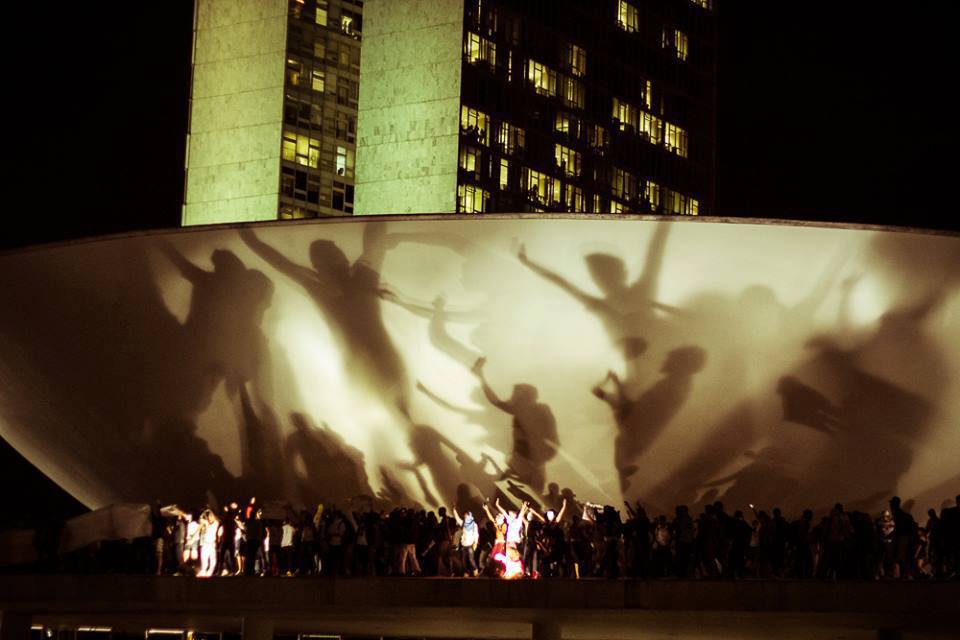
Brasil is still a poor country, inhabited by a population that is generally poor by global standards. The minimum wage, despite successive wage increases over the last years, is still a bad joke: 678 R$, which makes 242 Euros. Many workers live very far away from their workplace, which means they have to buy numerous tickets to get there. At the end of a month, another 20 cents can make the difference between eating and not eating. A number of low-paid workers, when they were interviewed by the media, have effectively admitted that due to the bus fare increase, they would have to go to sleep on an empty stomach more often than before.
Nonetheless, the revolt has not started for 20 cents and will not end as soon as the price is lowered again. Similar to the movement of Gezi Park in Istanbul, which did not really erupt because of the decision to build a shopping mall, or the demonstrations in Tunisia, which were not really caused by the suicide of Mohammed Bouazizi, no one in Brasil is revolting because of 20 cents. All of these uprisings share a set of deep-seated causes, which accumulate over the years, followed by a symbolic event which serves as the first spark that ultimately lights the fire.
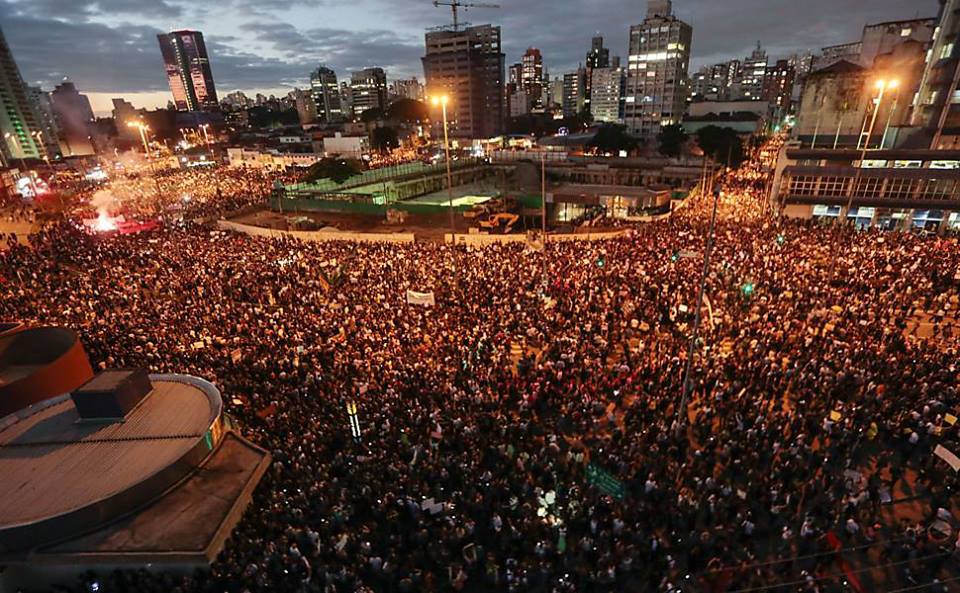
"If the price doesn't fall, the city will come to a halt"
Like many countries today, Brasil is living through a civil war between the state and the people. This war, up until a few weeks ago, was taking place without much noise; but was in no way more peaceful than it is now. For over a century, Brasil has been governed by politicians who see the revenue from taxes payed by their citizens — those who they ought to represent — as a mere bank account. Entire states belong to a certain group or a political dynasty; families who, before being elected to office, had already been the feudal lords of enormous latifundios, with family trees as old as the arrival of the Portuguese in Brasil. In Brasil, more than anywhere else in the world, the oppressors of today are the oppressors of tomorrow.
The foundation of Brasília, in 1960, has not improved anything. In fact, the passage from the old capital Rio de Janeiro to the new one in the middle of the country, planned and constructed within five years, an apotheosis of modernity, has only reaffirmed the odious tendencies of Brasilian politics. Rio de Janeiro was a cosmopolitan center in those days, inhabited by more than one million people, the heart of a very active workers' and citizens' movement. Brasília, in contrast, an artificial capital, did not even have any population before its foundation; even if this has changed over time, it continues to be primarily inhabited by an army of bureaucrats, who will not criticize the government very often, as they depend on it and are well-paid. None of the other metropoles of Brasil has the same political importance and the majority of them is too far away from Brasília for the population to travel there and directly show their indignation to our President.
Brasil is living through a special moment today, it's true. Some well-applied political programs over the last decade have brought impressive results: economic inequality — a real cancer of which Brasil was practically world champion — has been reduced notably. The Bolsa Família program has had much success to reduce poverty and the investments in higher education for the poor as well as for ethnic minorities have shown encouraging results.
This is not about questioning the things that have worked well. These experiences of the last 10 years under the administration of the PT (Partido dos Trabalhadores, or Workers' Party) must be protected and expanded if one wants to create a more just society, with less poverty and exploitation from the forces of the past, like the feudal lords from the Sarney family. This is not just about protesting against the government of the PT, against the President Dilma, or against Geraldo Alckmin, Fernando Haddad or Eduardo Paes. This is about freeing the country from its authoritarian, dictatorial, and cruel heritage.
If, at the end of these protests, the political class of Brasil — a class for itself more than any other — and its army of capitalist crétins who enrich themselves not through work but thanks to their personal connections, its journalists who prostitute themselves in the interest of an elite, its policemen who kill without hesitation, if all these oppressors are removed from power and forced to recognize that an era of real democracy has arrived, then I will be very happy to pay 20 cents more for my bus rides.
Brasil's Bourgeois-bohemian Revolutionaries
Here's something curious: In Brasil, demonstrations are traditionally seen as something for the "bo-bos," an entertainment for the children of the rich who have nothing productive to do, an excuse to paint one's face and to shout in the street. If the demonstrations are seen like this, then it's because, to a certain degree, it's correct. The majority of people who participate in the protests are effectively young people coming from rich families (sometimes very rich) who have a rather leftist political vision that is considered by some as incompatible with their social class. The strange combination of protest chants inspired by worker movements of the 20th century and the not-at-all-worker-like upbringing of the protesters is very often ridiculed by the media and this perspective ends up being internalized by a large part of the Brasilian population, a country where fatalistic cynicism has been lifted to the level of art.
But here's an interesting situation: When I participated in a demonstration of the "movement of the 20 cents" (using this name seems, at least for the moment, more practical than "movement to reduce the bus ticket price by 20 cents again"), we were stopped near the Central do Brasil, the famous train station which you probably know from the movie of the same name. The demonstration up to this point had been entirely peaceful, a real party of democracy. The majority of us were, in fact, university students from wealthy families, but already then one could see that this movement had a social base that was more heterogeneous: we also had numerous people from independent professions, retirees, and poor workers among us who were dissatisfied by this fare increase. It's very rare for a protest in Rio de Janeiro to attract more than 200 people but we were around two thousand from several social classes. I began to realize that it was something different this time. The people of Brasil were waking up from their long sleep — and they were furious.
The calm was not there to stay. Special forces from the police, with their shields, their black uniforms, frightening looks, and "non-lethal" weapons had just arrived and started to make a line in front of us. Our group stopped. The songs fell silent. The situation almost seemed like a duel from a Western movie. All of a sudden, something happened. The people coming out of the Central do Brasil joined us. They were street side vendors, selling fries, or mothers with four children, the children in the street, or hobos and beggars. The poor, the poorest of the city of Rio, came together and positioned themselves right between us and the police. A few minutes later, the riot police shot at us and arrested 40 people, among them a friend of mine. On the run, as I was trying to seek refuge in the closest metro stop, I saw a man who was crying and seemed weak. He was bleeding — a victim of "non-lethal" arms.
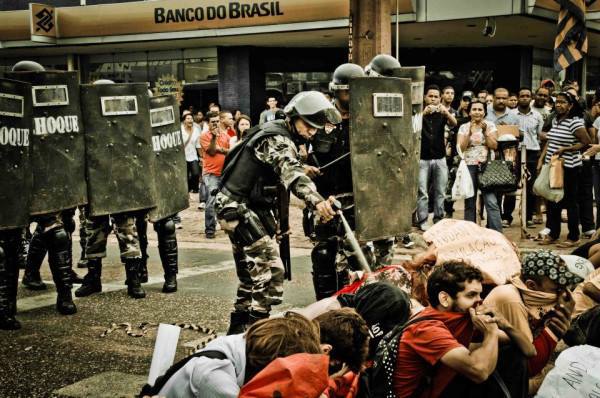
Repression: the mask of democracy is falling
These scenes have repeated themselves innumerable times, at all places where the people have had the courage to lift their voice against a decision which directly affects the majority of the population without ever being consulted. An authoritarian way of doing politics, and a type of politics which is only interested to benefit a cartel of bus companies, well-known for their connections with the electoral campaigns of the mayor of Rio and other important figures. Below all of this: a deaf-mute federal state that takes the people hostage for private companies, financed by public money. The results are: bad services, high fares, revolt.
In São Paulo, the police shot at demonstrators who were carrying flowers. Just a couple of days later, they forbade carrying vinegar in the city because it could be used against the effects of tear gas; they simply allowed themselves to search people, looking for it. In Minas Gerais, all demonstrations were banned during the FIFA Confederations Cup 2013. One project that is being discussed in the Chamber of Deputies is a bill that would characterize all demonstrations during the World Cup 2014 as "terrorist," including similarly grave punishments.
In Rio de Janeiro, meanwhile, in the wake of a new confrontation with the police on June 16 close to the Maracanã stadium, certain demonstrators tried to flee from the fight by hiding at a friend's house. The police, then, started to invade the houses in search of these "criminals." With these type of dictatorial police raids, it is clear that the mask of our democracy is falling and the authoritarian roots of our political establishment are becoming visible once more — roots originating in a compromise with the military dictatorship from 1964 to 1985, which ended by bringing those who had fought for democracy closer to the old major figures of authoritarianism.
The symbolic alliance between Lula, the hero of the labor movement of the 70s and 80s, and Paulo Maluf, the last presidential candidate of the moribund military regime, shows that the political class is just interested in power itself and does not have an actual political project to offer. But thanks to them and their watchdogs inside the police force, the "movement of the 20 cents" is becoming a movement allowing us to say what we think, to assert the right to say that one wishes to live in a real democracy.
This is what is happening in Brasil. But this doesn't stop at our borders – it's a global struggle, against all dictators, whether they come from a Unity Party, from Moscow or from Capital. Our world is interconnected and so will be the global resistance against those who believe they can govern us with their orders. It is winter here in Brasil at the moment but, figuratively speaking, we are living through our spring; a spring of popular action and mobilization against widespread injustice. I hope that spring will last — otherwise, it might be the last spring before an eternal winter.
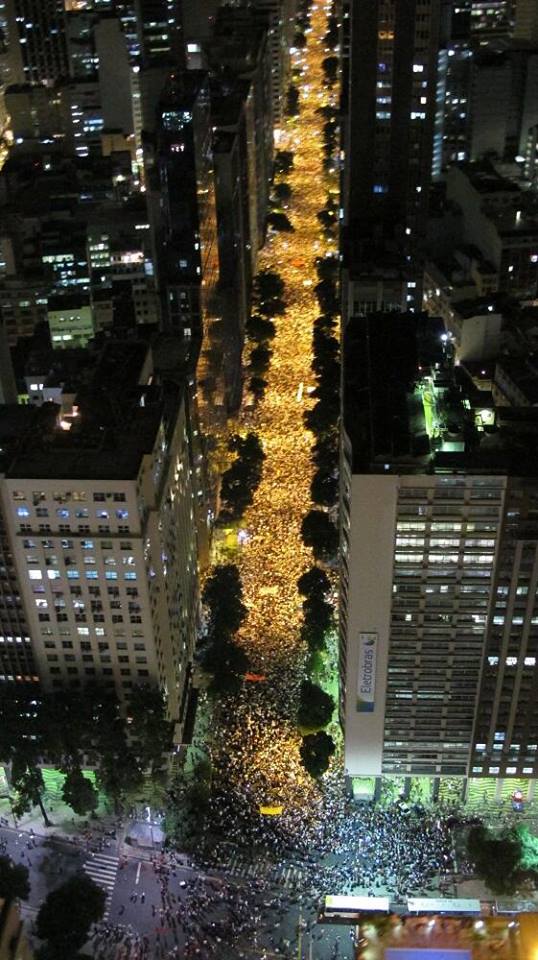
Franco A. is an undergraduate student of International Relations at the Pontifical Catholic University of Rio de Janeiro. This article was translated from French and first published by Truth Is A Beaver.

